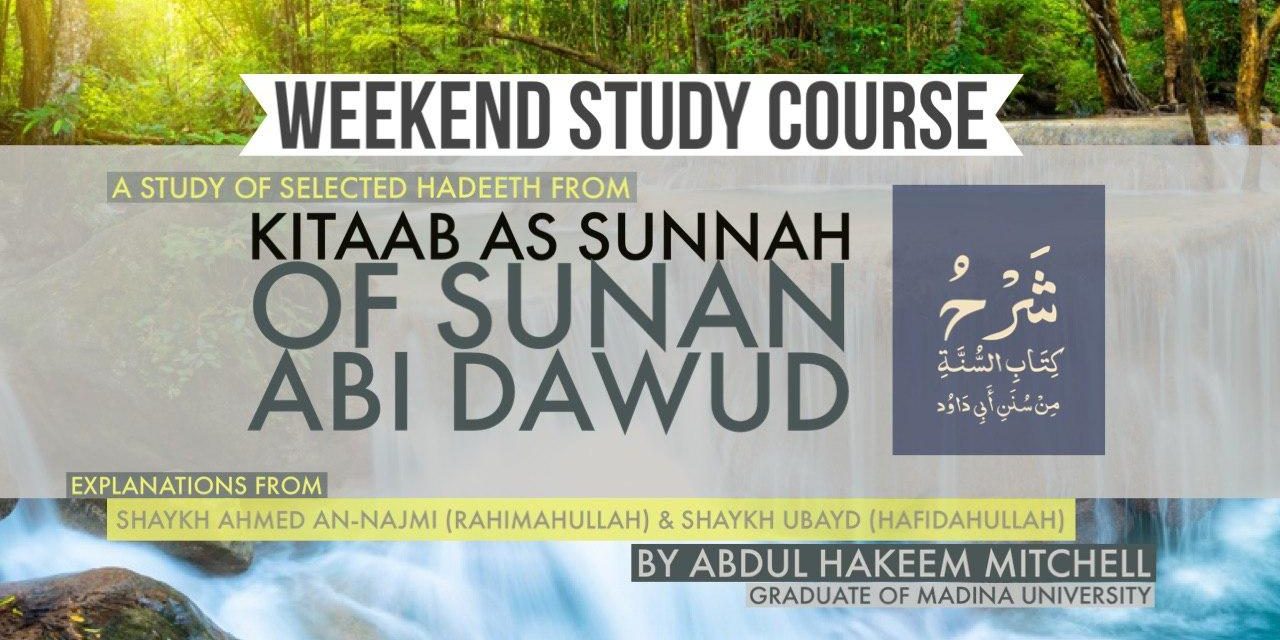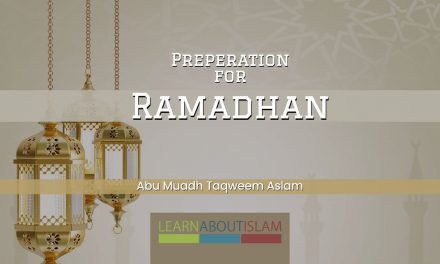This is the second series of the Book of Sunnah of Sunan Abi Dawood, using the explanation of Shaykh Ubayd and Shaykh Ahmed an-Najmee ready by Ustaadh Abdulhakim Mitchell
See the Notes at the bottom of the post
This lesson is a continuation of the previous series – https://soundcloud.com/learnaboutislam/sets/selected-ahadeeth-from-kitaab
Notes Below
Lesson 1 Notes
This lesson was an overview of the field of hadith. In this lesson we cover:
Terminology around hadith
- The definition of a hadith
- The hadith Qudsi
- What are the 5 conditions for a hadith to be accepted as Sahih?
Each of the 5 is discussed
- What are the types of Hassan hadith
- Can a weak hadith ever be accepted?
- What is the meaning of a “weak” hadith?
- What is the definition of a companion?
- What is the ruling on accepting their narrations?
On the books of Hadith
- What are the 6 books of Sunnah?
- Which are the most authentic books?
- What is the difference between Sahih Bukhari and Sahih Muslim
- What are the other books aside of the 6 main books of Hadith
Recorded at the Salafi Centre of Manchester on 23/08/2019 and streamed live on www.SunnahRadio.Net
Lesson 2 Notes
Chapter – luzoom al-sunnah
Hadith of Miqdaad
Beware! I have been given the Qur’an and something like it, yet the time is coming when a man replete on his couch will say: Keep to the Qur’an; what you find in it to be permissible treat as permissible, and what you find in it to be prohibited treat as prohibited. Beware! The donkey, beasts of prey with fangs, a find belonging to confederate, unless its owner does not want it, are not permissible to you If anyone comes to some people, they must entertain him, but if they do not, he has a right to mulct them to an amount equivalent to his entertainment.
Hadith of Abu Rafi
The Prophet (ﷺ) said: Let me not find one of you reclining on his couch when he hears something regarding me which I have commanded or forbidden and saying: We do not know. What we found in Allah’s Book we have followed.
Hadith of Aisha
If any one introduces into this affair of ours anything which does not belong to it, it is rejected. Ibn `Isa said: The Prophet (ﷺ) said: If anyone practices any action in a way other than our practice, it is rejected.
Hadith of Irbaad
AbdurRahman ibn Amr as-Sulami and Hujr ibn Hujr said: We came to Irbad ibn Sariyah who was among those about whom the following verse was revealed: “Nor (is there blame) on those who come to thee to be provided with mounts, and when thou saidst: “I can find no mounts for you.”
We greeted him and said: We have come to see you to give healing and obtain benefit from you.
Al-Irbad said: One day the Messenger of Allah (ﷺ) led us in prayer, then faced us and gave us a lengthy exhortation at which the eyes shed tears and the hearts were afraid.
A man said: Messenger of Allah! It seems as if it were a farewell exhortation, so what injunction do you give us?
He then said: I enjoin you to fear Allah, and to hear and obey even if it be an Abyssinian slave, for those of you who live after me will see great disagreement. You must then follow my sunnah and that of the rightly-guided caliphs. Hold to it and stick fast to it. Avoid novelties, for every novelty is an innovation, and every innovation is an error.
Hadith of ibn Mas’odd
“Beware! The extremists perished,” saying it three times.
Shaykh Ubayd mentions 7 benefits:
1. The obligation of returning to the sunnah as it is a revelation from Allah
2. To seek to suffice only with the Sunnah
3. Actions can not be righteous except if two conditions are met: sincerity to Allah alone and that is in accordance with the Sunnah
4. Refutation of whoever opposes the text, even if he is a a great scholar
5. Sticking to the guidance of the rightly guided caliphs
6. The prohibition of overburdening oneself
7. The obligation of honouring the guests
The narration of Irbaad:
– It is a sign of prophethood that the messenger told us of the splitting that will occur
– This splitting is a prohibited matters
– What are the two types of Qadar?
Recorded at the Salafi Centre of Manchester on 23/08/2019 and streamed live on www.SunnahRadio.Net
Lesson 3 Notes
Lesson 4 Notes
Lesson 4 – Studying the book of Sunnah from Sunan Abi Dawood
In this lesson we recapped:
- who the “mukthiroon” are, the companions who narrated the most ahaadeeth
- The actual name of Sahih Bukhari
- What is the difference between a “Jaami” book of hadith and a “musnad”?
- What does the full title of Sahih Bukhari mean?
We covered:
- Manners of asking questions
- The harms of constant questioning that lead to harm
- If two hadiths appear to contradict each other, how do you deal with them?
- Asking questions that are beneficial are from the attributes of the student of knowledge. Particularly if it benefits the questioner and those around him.
Lesson 5 Notes
In this lesson Ustaadh Abdulhakim brings benefits from a wide variety of scholars such as Shaykh Ubayd, Shaykh Ahmed an-Najmee, Shaykh Saalih al-Fawzaan, Shaykh Zayd al-Madkhalee and others
We covered:
- That asking too many questions is disliked by Allah, ie
- Asking to the extent that the questions are no longer beneficial
- Asking for the wealth of the people
- In the same hadith, other disliked matters are, “he said, she said” and to waste wealth.
- The rebuke to the ones who asks unnecessary questions
Ustaadh Abdulhakim Mitchell mentions a number of benefits regarding:
- The mannerisms of the student of knowledge with himself
- The mannerisms of the student of knowledge with his Shaykh
- The mannerisms of the student of knowledge with this fellow students
Shaykh Fawzaan – acting upon knowledge is from the characteristics of a da’ee. For indeed, he should benefit from that which knows and calls to. He should not be a means for those who oppose his dawah, to use him as a proof as to why they reject the truth.
Lesson 6 Notes
In this lesson ustaadh Abdulhakim Mitchell brings benefits form Shaykh Ubayd al-Jaabiree, Shaykh Ahmed an-Najmee and Shaykhul Islam ibn Taymiyyah.
In this lesson we covered the chapter of Tafdheel.
– Very brief introduction to Abdullah ibn Umar, the narrator
– The most virtuous of people after the prophet is Abu Bakr, then ‘Umar then Uthmaan.
– This important, because the Shia when they first started did not consider this order to be important. They considered Ali better than Uthmaan but still had respect for Abu Bakr and Umar
– What is the difference between Zuhd & Wara’?
– What did Shaykhul Islaam ibn Taymiyyah say on the topic of Tafdheel?
– How did Sayyid Qutb oppose the Salafi in this topic?








